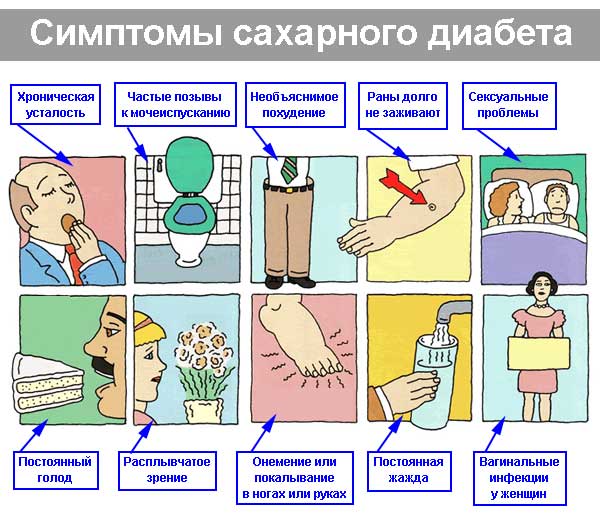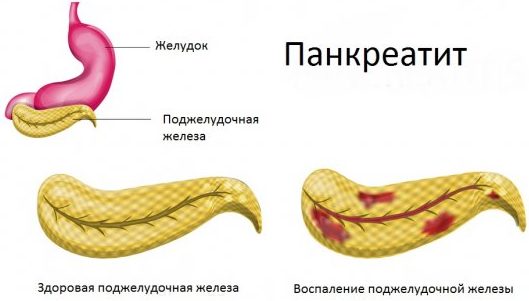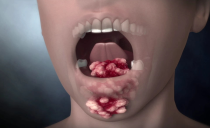Why does an adult smell of acetone from his mouth and how to get rid of the smell
A symptom such as acetone smell coming from the mouth is not the norm and should be treated. The cause of the smell of acetone from the mouth of an adult can be a serious disease. The intensity of the smell is different, it depends on the degree of aggressiveness of the pathological processes taking place in the body.
Content
What is acetone, how is it formed in the body
Not everyone knows what the smell of acetone from the mouth means, so patients rarely seek medical attention in a timely manner. To understand why people can smell of acetone, you need to find out how it is formed in the body.
Acetone is a chemical substance that is part of many solvents and smells strongly. The smell of not pure solvent, but soaked apples, may come from the oral cavity.
Acetone is formed during the breakdown of fats in the liver, then it enters the bloodstream. The body independently gets rid of ketone bodies (acetone), releasing them through respiration, urine and sweat. If the mechanism fails, ketone bodies accumulate and the smell intensifies.
Acetone is excreted not only through the lungs, but also through the kidneys. So, bad breath is not the only symptom of the formation of ketone bodies, in addition to exhaled air, sweat and urinary secretions can smell.
Causes of the smell of acetone from the mouth and methods of treatment
Acetone halitosis in adults is always alarming and even frightening. It comes from the lungs, so with the help of hygienic rinses, fresheners and toothpastes, you can not get rid of the problem. There are many diseases, pathological conditions and disorders, accompanied by the smell of acetone.
Why an adult can smell acetone from her mouth:
- Due to prolonged fasting.
- With diabetes.
- Against the background of a malfunction in the thyroid gland.
- With pathologies of the liver and kidneys.
- With infection.
- Against the background of pancreatic diseases.
Prolonged fasting
If you follow a diet that consumes a minimal amount of carbohydrates, the formation of ketones is a normal reaction of the body. The occurrence of acetone halitosis is provoked by starvation: a lack of carbohydrates causes an accelerated breakdown of fats and leads to a lack of energy, as a result, a large number of pathogenic substances begin to be produced in the human body - intoxication occurs.
It is possible to establish that the cause of the appearance of the smell of acetone from the mouth in an adult was hunger, according to the following accompanying signs:
- increased irritability;
- dizziness;
- weakness and malaise;
- fragility of hair and nails.
Among the most dangerous dietary techniques, experts include the Kremlin, protein, French, Atkins diet. All of these nutrition systems are low-carb, and a lack of carbohydrates is fraught with impaired functioning of all body systems.
If the acetone aroma appears due to starvation, no treatment will be required.To normalize the body's work, it is enough to switch to a balanced diet consisting of carbohydrates, proteins and fats.
Diabetes
The smell of acetone can come from the mouth of a person with a disease such as diabetes. If the level of glucose in the blood serum is very high, which does not penetrate the cells due to lack of insulin, diabetic ketoacidosis can develop - an increase in the level of ketones in the blood.
When diabetes becomes the cause of acetone halitosis, the patient has the following symptoms:
- dry mouth
- intense thirst;
- weakness;
- vomiting
If a person suffering from diabetes has an acetone breath, an ambulance should be called immediately. This condition is a serious danger to the patient, as it can result in a coma or even death. With ketoacidosis coma, insulin is urgently administered to the patient. It will also help get rid of the stench coming from the mouth.
Thyroid disease
Impaired thyroid function is another common answer to the question of why an adult could smell acetone from the mouth. Acetone odor can occur with any endocrine disorders. For example, with the development of thyrotoxicosis, the thyroid gland begins to actively produce hormones that break down fats and proteins. With such a violation, ketone bodies are formed in the blood, the concentration of which is constantly increasing.
Endocrine disease can be recognized by the following symptoms:
- increased sweating;
- mental irritability, irritability, nervousness;
- heart palpitations and heart rate;
- bulging eye syndrome.
If untreated, a high level of hormones will lead to rapid weight loss, even with good appetite. In addition, patients begin to complain of colic in the stomach and yellowing of the skin. During therapy, patients are given droppers that help normalize the release of hormones and prevent dehydration.
Liver and kidney disease
The next reason that the mouth starts to smell like acetone is a malfunction in the liver or kidneys (renal failure, pyelonephritis). These organs cleanse the blood and remove harmful substances from the body. With the development of pathological processes, their functions are violated, as a result of which ketone bodies cease to leave the body.
In severe cases of kidney or liver disease, an unpleasant odor can come not only from the mouth, but also from urine. In some patients, even the body exudes the smell of acetone, which is explained by the release of ketones with sweat.
Acetone halitosis often occurs with renal tubule deformity, against the background of such a pathology, renal dystrophy or neurosis develops - processes leading to metabolic disorders and the breakdown of fats.
If the patient’s mouth began to smell like acetone, then the disease of the liver or kidneys turned into a neglected form. After the onset of halitosis, other signs may appear:
- pain in the lumbar region;
- swelling;
- frequent urination;
- increased blood pressure - blood pressure;
- fading, dryness and itching of the skin;
- temperature increase;
- profuse sweat;
- decreased appetite, dry mouth;
- interruptions in the work of the heart, shortness of breath;
- joint pain.
If several symptoms are listed, it is necessary to immediately contact a specialist, since intoxication of the whole organism is possible.
Infectious diseases
The flow of infectious diseases in the body undermines the work of all its systems. However, ketone bodies are rarely produced during infections; such changes can occur only with severe inflammation.
With infection, the formation of acetone in the tissues can contribute to pregnancy, chronic pathologies. Ketones are often formed after surgery.The development of ketonemia is associated with dehydration, which occurs in almost any infectious disease.
Pathology of the pancreas
A common cause of the formation of ketone bodies in an adult is pancreatitis. Pathological halitosis occurs in chronic pancreatic disease. To remove the persistent smell of bitterness or the aroma of acetone, manifested due to exacerbation of pancreatitis, is possible only through the treatment of the disease. Sprays and other refreshing products will not help in this situation.
What are the lumps of acetone?
In almost every case of a coma, the patient has an acetone odor emanating from the oral cavity or body.
At what coma does the smell of acetone from the mouth appear:
- alcoholic
- uremic;
- hepatic;
- diabetic: hyperglycemic and hypoglycemic.
Alcohol
Acetonemic aroma can be heard from a person with alcohol poisoning. With excessive alcohol consumption, coma occurs in almost all, a small amount of alcohol-containing drinks can cause a coma only in people with absolute intolerance to ethyl.
If you do not provide timely medical assistance to a person who has fallen into an alcoholic coma, a fatal outcome is possible.
With a deep coma, the patient lacks consciousness, reflexes fade, pressure drops. The skin turns blue, the body becomes covered with sticky sweat, a sharp smell of alcohol is felt from the oral cavity.
Uremic
Adults can fall into a uremic coma caused by chronic renal failure. The latter develops against the background of diseases and disorders such as:
- glomerulonephritis;
- pyelonephritis;
- arteriosclerotic wrinkled kidney.
In addition to the acetone odor from the mouth, with these diseases, symptoms such as lethargy, weakness, thirst, hoarseness, sore throat, nausea, vomiting, and lethargy can be observed.
Hyperglycemic and hypoglycemic coma
With an increased content of glucose in blood serum (more than 3.3–5.5 mmol / l), hyperglycemia develops. The development of hyperglycemic coma is not only affected by people with diabetes - the following causes of this condition and the appearance of the smell of acetone are known:
- pancreatitis, pancreatic oncology;
- endocrine disorders;
- infection;
- pathology of the liver, kidneys;
- genetic disorders;
- eating a lot of calories;
- prolonged stress;
- excess of permissible physical exertion.
A precomatose state can be recognized by signs such as nausea, weakness, vomiting, frequent breathing, cold lower and upper limbs.
Treatment of hyperglycemic coma is reduced to lowering blood glucose levels by taking insulin.
Hypoglycemic coma can also be accompanied by increased production of ketone bodies. With the acetonemic state caused by hypoglycemia, the level of glucose in the blood serum drops to such low levels that the brain tissue begins to experience energy starvation. The value of glucose level with this pathology is 1.5–2.5 mmol / L.
Hepatic coma
Hepatic coma develops with severe liver damage that depresses the central nervous system. Acetonemic aroma causes disorders in the liver, such as toxic dystrophic damage, extensive necrotic processes, cirrhotic changes in viral hepatitis.
Pathology can be recognized by the following signs:
- increasing retardation;
- excessive sweating;
- disorientation;
- confusion of consciousness;
- yellowing of the skin.
With close contact with a person who has fallen into the hepatic coma, you can feel the characteristic smell of the liver coming from his mouth. The occurrence of acetonemic vomiting is not excluded.
Smell of acetone from the mouth in men
Any pathological processes in the body are reflected in the chemical composition of urine.In males, urine may have an acetate smell when developing infectious diseases:
- cystitis;
- urethritis;
- pyelonephritis;
- prostatitis.
With a bacterial lesion of the prostate gland, urine becomes cloudy, and a sharp chemical smell emanates from it. Having discovered such changes in the body, a man should consult a doctor - a urologist, andrologist or venereologist.
One of the reasons why an adult male can smell of acetone from his mouth is the development of a malignant formation. Halitosis occurs when a tumor is localized in the area of the bladder, prostate, kidney.
A change in the composition and smell of urine does not always indicate a pathological process in the body. The smell of acetone can come from the mouth of adult men and women after consuming spices or taking certain supplements based on synthetic nutrients.
How to get rid of the smell of acetone from the mouth
To get rid of the bad breath of acetone from the mouth, you must determine why it appeared. Do not resort to self-medication and the use of folk remedies, since ignoring the cause of the symptom, you can do even more harm to the body.
To get rid of acetone stink for a short time, you can rinse your mouth with soda and saline, decoction of aromatic herbs, chew a slice of lemon or other citrus fruit, chew mint gum. In addition to improvised means, you can also use pharmacy: Septogal, Chlorophyllipt, Asepta.








